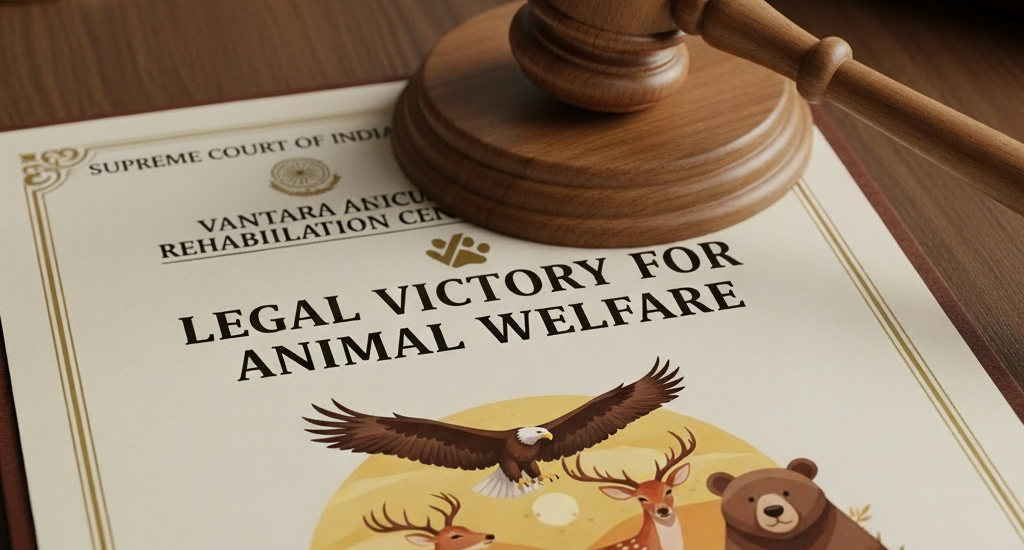Supreme Court After SIT Probe: Vantara Must Follow Law, Reputation Must Not Be Tarnished
- September 16, 2025
- Posted by: lawandhonour.com
- Category: LEGAL NEWS

The Supreme Court of India has accepted the report of a Special Investigation Team (SIT) that was formed to probe a range of allegations against Vantara, the Greens Zoological Rescue and Rehabilitation Centre in Jamnagar, Gujarat. The Court’s decision, which follows a thorough review of the SIT’s findings, gives a clean chit to the organization and dismisses claims of unlawful animal procurement, mistreatment, and financial irregularities.
Background of the Case
The Court’s intervention was prompted by two Public Interest Litigations (PILs) that raised serious accusations against Vantara. The complaints, which were largely based on media reports and social media content, alleged that Vantara had engaged in the illegal acquisition of animals, particularly elephants, both domestically and from abroad. Furthermore, the petitions claimed that the animals were being held in subpar conditions and that the organization was involved in financial impropriety and money laundering.
In response to these allegations, the Supreme Court, recognizing the need for an independent and factual appraisal, constituted a four-member SIT. The team was headed by a former Supreme Court judge and included other high-ranking officials. Its mandate was to conduct a physical inspection and investigate all aspects of the allegations, including:
- Compliance with the Wildlife (Protection) Act, 1972, and other relevant laws.
- Adherence to international conventions like CITES (Convention on International Trade in Endangered Species of Wild Fauna and Flora).
- Standards of animal care, veterinary services, and welfare.
- Financial compliance and allegations of money laundering.
SIT Findings and Supreme Court’s Observations
After a comprehensive inquiry, the SIT submitted its report to the Supreme Court. The key findings of the report, as noted by the Court, are as follows:
- Legal Compliance: The SIT found that Vantara’s acquisition of animals, including elephants, was carried out in full compliance with all legal and regulatory frameworks. No evidence of unlawful procurement or smuggling was found.
- Animal Welfare: The report concluded that Vantara’s animal welfare standards met and often exceeded the benchmarks set by the Central Zoo Authority and global best practices. Allegations of poor living conditions and high mortality rates were found to be unsubstantiated. The facility has also received a “Global Humane Certified Seal of Approval” from an independent international body.
- Financial Integrity: The SIT, in coordination with various government agencies, found no evidence of money laundering, misuse of carbon credits, or financial irregularities.
Upon reviewing the report, the Supreme Court expressed its satisfaction with the findings. The Court emphasized that with the SIT’s independent findings now on record, the complaints against Vantara stand closed. The bench made a significant observation, stating that Vantara is in “strict compliance with laws” and that its reputation should not be tarnished by unfounded allegations. The Court also refused to entertain further pleas on the same set of issues, reinforcing the finality of the SIT’s conclusions.
Implications of the Ruling
This ruling is a crucial development that provides legal clarity and validation for Vantara’s operations. For any organization, especially one operating in a sensitive area like wildlife conservation, a clean chit from the highest court is a testament to its commitment to legal and ethical standards. The Court’s stern words against tarnishing the organization’s image based on baseless claims also set a precedent against the use of speculative information to discredit legitimate efforts.
The judgment serves as a reminder that legal proceedings require concrete evidence rather than relying on hearsay or media narratives. It underscores the judiciary’s role in protecting institutions that are found to be operating in good faith and in compliance with the law

